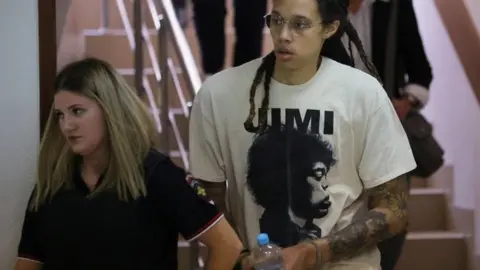Brittney Griner: 'No higher priority' than bringing her home
 Reuters
ReutersThere is "no higher priority" than bringing basketball star Brittney Griner home, US Secretary of State Anthony Blinken said on Friday, as her drug trial in Russia begins.
Ms Griner, a three-time WNBA league champion and seven-time All-Star, was seen arriving handcuffed at a court in the town of Khimki, outside Moscow.
She faces 10 years in prison.
The US says she is being wrongfully held. Russia denies that her detention is motivated by US-Russia tensions.
Speaking outside the courthouse, a senior US embassy official said she had spoken to Ms Griner who was "as well as can be expected".
"She asked me to convey that she is in good spirits and is keeping up the faith," said Elizabeth Rood, the deputy chief of mission in Moscow.
Ms Griner was detained on 17 February at a Moscow-area airport after cannabis oil was allegedly found in her luggage.
A veteran of the Women's National Basketball Association (WNBA), she is considered one of the most dominant players in her sport's history.
Colin Allred, a Democratic congressman involved with her case, told the BBC on Friday that Ms Griner was "being used as a political pawn".
"This is a sham trial," he said. "But I do think that we're going to get Brittney home".
On the eve of Ms Griner's trial, her wife Cherelle Griner, told CNN the Biden's administration had not done enough to bring her partner home.
"I have to push people to make sure the things they are telling me are matching their actions," she said. "It's really really difficult."
The US State Department declined to comment.
On Friday, Secretary of State Anthony Blinken said in tweet that US officials attended Ms Griner's trial in Moscow.
"We - and I personally - have no higher priority than bringing her and other wrongfully detained Americans, including Paul Whelan, home," he said. Mr Whelan, a US citizen and former marine, was first detained in Russia in December 2018.
Ms Griner had travelled to Russia to play for EuroLeague team UMMC Ekaterinburg, where she had worked since 2014 during the US off-season. Roughly half of WNBA players compete overseas in the off-season.
For most, it's a way to augment their domestic income, with WNBA players being paid roughly five times more in Russia than they do in the US.
The 10-year maximum prison sentence faced by Ms Griner applies to "large-scale transportation of drugs".
However, even if acquitted at the trial, the government in Russia has the authority to overturn any decision and still send her to prison.